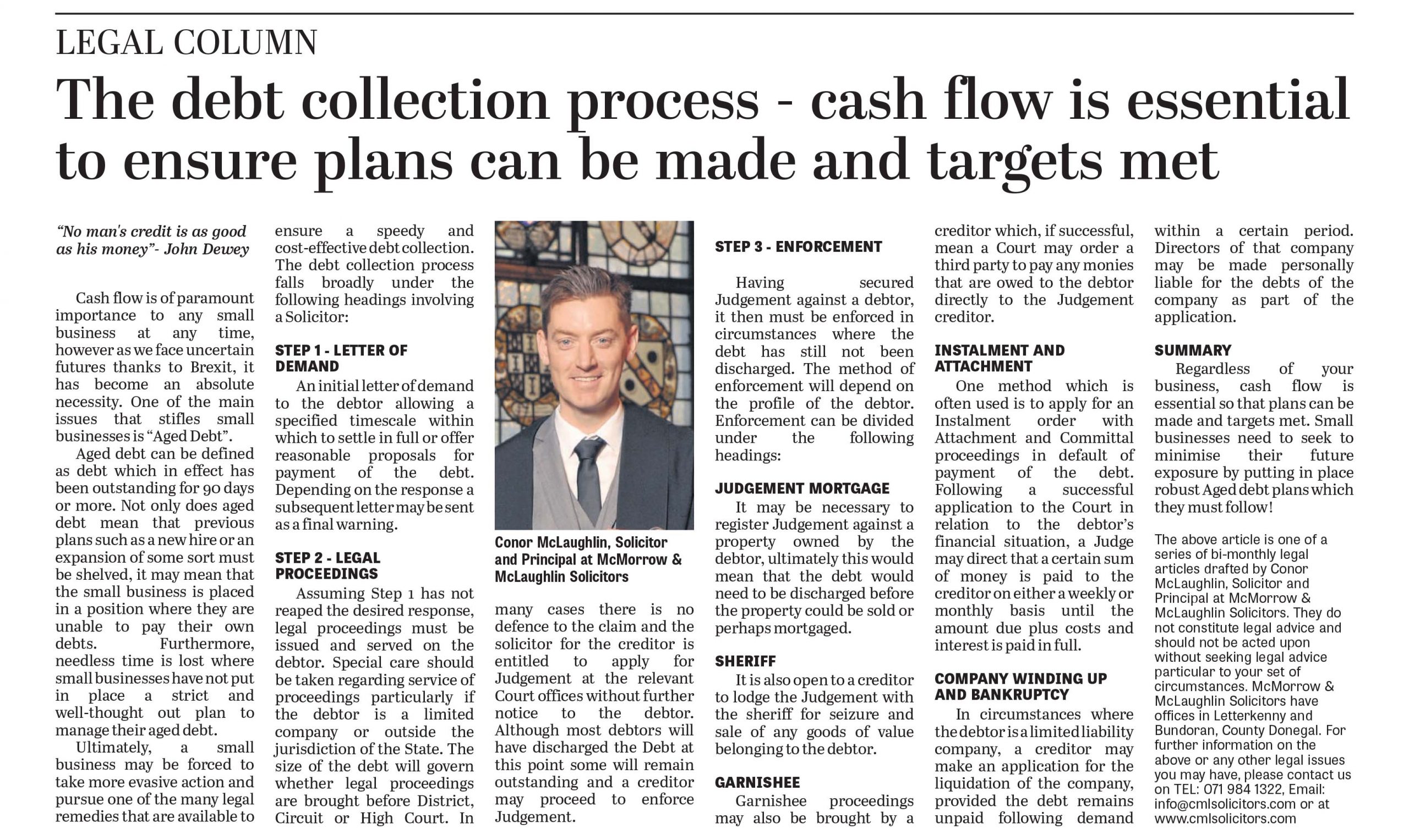
Cash flow is of paramount importance to any small business at any time, however as we face uncertain futures thanks to Brexit, it has become an absolute necessity. One of the main issues that stifles small businesses is “Aged Debt”. Aged debt can be defined as debt which in effect has been outstanding for 90 days or more. Not only does aged debt mean that previous plans such as a new hire or an expansion of some sort must be shelved, it may mean that the small business is placed in a position where they are unable to pay their own debts. Furthermore, needless time is lost where small businesses have not put in place a strict and well-thought out plan to manage their aged debt.
Ultimately, a small business may be forced to take more evasive action and pursue one of the many legal remedies that are available to ensure a speedy and cost-effective debt collection. The debt collection process falls broadly under the following headings involving a Solicitor:
Step 1 – Letter of demand
An initial letter of demand to the debtor allowing a specified timescale within which to settle in full or offer reasonable proposals for payment of the debt. Depending on the response a subsequent letter may be sent as a final warning.
Step 2 – Legal Proceedings
Assuming Step 1 has not reaped the desired response, legal proceedings must be issued and served on the debtor. Special care should be taken regarding service of proceedings particularly if the debtor is a limited company or outside the jurisdiction of the State. The size of the debt will govern whether legal proceedings are brought before District, Circuit or High Court. In many cases there is no defence to the claim and the solicitor for the creditor is entitled to apply for Judgement at the relevant Court offices without further notice to the debtor. Although most debtors will have discharged the Debt at this point some will remain outstanding and a creditor may proceed to enforce Judgement.
Step 3 – Enforcement
Having secured Judgement against a debtor, it then must be enforced in circumstances where the debt has still not been discharged. The method of enforcement will depend on the profile of the debtor. Enforcement can be divided under the following headings:
- Judgement Mortgage
It may be necessary to register Judgement against a property owned by the debtor, ultimately this would mean that the debt would need to be discharged before the property could be sold or perhaps mortgaged.
- Sheriff
It is also open to a creditor to lodge the Judgement with the sheriff for seizure and sale of any goods of value belonging to the debtor.
- Garnishee
Garnishee proceedings may also be brought by a creditor which, if successful, mean a Court may order a third party to pay any monies that are owed to the debtor directly to the Judgement creditor.
- Instalment and Attachment
One method which is often used is to apply for an Instalment order with Attachment and Committal proceedings in default of payment of the debt. Following a successful application to the Court in relation to the debtor’s financial situation, a Judge may direct that a certain sum of money is paid to the creditor on either a weekly or monthly basis until the amount due plus costs and interest is paid in full.
- Company Winding Up and Bankruptcy
In circumstances where the debtor is a limited liability company, a creditor may make an application for the liquidation of the company, provided the debt remains unpaid following demand within a certain period. Directors of that company may be made personally liable for the debts of the company as part of the application.
Summary
Regardless of your business, cash flow is essential so that plans can be made and targets met. Small businesses need to seek to minimise their future exposure by putting in place robust Aged debt plans which they must follow!
